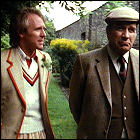 A schoolboy named Turlough cons a classmate into “borrowing” a vintage roadster belonging to one of the teachers at his private school, naturally getting into an accident moments later. During a near-death experience, Turlough is forced into a deadly pact by the Black Guardian: Turlough’s new mission is to kill a Time Lord known as the Doctor at any cost. Soon afterward, the Doctor lands the TARDIS on a seemingly derelict spacecraft orbiting Earth in both space and time, only to find that somehow, someone on board is still maintaining the vessel. The Doctor soon becomes a pawn in alien renegades’ plot to end their pitiful immortality, and discovers that his old friend Brigadier Lethbridge-Stewart, now a math teacher at Turlough’s school, is a pawn. It also soon becomes evident that Turlough is no ordinary schoolboy.
A schoolboy named Turlough cons a classmate into “borrowing” a vintage roadster belonging to one of the teachers at his private school, naturally getting into an accident moments later. During a near-death experience, Turlough is forced into a deadly pact by the Black Guardian: Turlough’s new mission is to kill a Time Lord known as the Doctor at any cost. Soon afterward, the Doctor lands the TARDIS on a seemingly derelict spacecraft orbiting Earth in both space and time, only to find that somehow, someone on board is still maintaining the vessel. The Doctor soon becomes a pawn in alien renegades’ plot to end their pitiful immortality, and discovers that his old friend Brigadier Lethbridge-Stewart, now a math teacher at Turlough’s school, is a pawn. It also soon becomes evident that Turlough is no ordinary schoolboy.
written by Peter Grimwade
directed by Peter Moffatt
music by Paddy KingslandGuest Cast: Nicholas Courtney (Brigadier Lethbridge-Stewart), Valentine Dyall (Black Guardian), David Collings (Mawdryn), Angus MacKay (Headmaster), Stephen Garlick (Ibbotson), Roger Hammond (Dr. Runciman), Sheila Gill (Matron), Peter Walmsley (First mutant), Brian Darnley (Second mutant), Lucy Baker (Child Nyssa), Sian Pattenden (Child Tegan)
Broadcast from February 1 through 9, 1983
LogBook entry & review by Earl Green
Review: Among other things, Mawdryn introduces us to Turlough (Mark Strickson), easily the most distinctive companion of Peter Davison’s tenure as the Doctor. Now, admittedly, no one really knew how to handle Turlough after this story, but few companions have had as interesting an entrance as this. One of the two showpieces of Doctor Who’s 20th season (the other, in my opinion, being Englightment, which closed the trilogy of Turlough/Black Guardian stories that begins in this serial), Mawdryn Undead succeeds in creating a very creepy atmosphere, and makes effective use of the beloved Brigadier, even though the original script called for math teacher Ian Chesterson – one of the Doctor’s three original companions when the series launched in 1963 – to fill that role. (In a little bit of retroactive continuity, Paul Cornell later suggested in the 1993 New Adventures novel “No Future” that the Brigadier’s mysterious nervous breakdown, alluded to in this episode, was caused by events he experienced with the seventh Doctor in 1976.) Another neat element is the creepy “Someone just walked over my grave” sequence in which the Doctor helps the Brigadier regain his memory, accompanied by atmospheric music and numerous clips from various UNIT-related stories dating all the way back to 1967 – exactly the kind of continuity-themed touch that the entire season strove so hard to include, but so seldom succeeded on this level.
The music isn’t just noteworthy in that scene alone, however – Paddy Kingsland, easily the composer with the most distinctive sound between 1980 and 1986 on Doctor Who, is responsible for a lot of the show’s atmosphere, contributing numerous memorable, hummable cues throughout the four episodes.
 Why the big controversy? This episode contradicts a supposedly key bit of Doctor Who continuity. In the earlier episode Pyramids Of Mars, it is suggested that companion Sarah Jane Smith is from 1980, though her first episode aired in 1974, which would presumably date all of the “present day” Earth stories from Jon Pertwee’s last season around 1980. Yet Mawdyrn Undead tells us that it is now 1983 (the year the show was filmed), and that the Brigadier retired in 1977. All that fuss over two dating references written by different writers and filmed by different production teams and actors, eight years apart. Personally, I stick with the theory – as does Paul Cornell, apparently – that the Brigadier retired in the 70s, which means that Sarah isn’t from 1980, but from 1974. It’s really not that big a continuity mishap in my book.
Why the big controversy? This episode contradicts a supposedly key bit of Doctor Who continuity. In the earlier episode Pyramids Of Mars, it is suggested that companion Sarah Jane Smith is from 1980, though her first episode aired in 1974, which would presumably date all of the “present day” Earth stories from Jon Pertwee’s last season around 1980. Yet Mawdyrn Undead tells us that it is now 1983 (the year the show was filmed), and that the Brigadier retired in 1977. All that fuss over two dating references written by different writers and filmed by different production teams and actors, eight years apart. Personally, I stick with the theory – as does Paul Cornell, apparently – that the Brigadier retired in the 70s, which means that Sarah isn’t from 1980, but from 1974. It’s really not that big a continuity mishap in my book.
Among the very few gripes I have with Mawdryn are the fact that, as commonly occurred in John Nathan-Turner’s reign as producer, everyone in the universe knows who the Time Lords are and where Gallifrey is, and numerous brief argument scenes between Tegan and virtually everyone else in the story. The all-too-common use of “bitchy Tegan” scenes to pad out scripts that came up too short around this time made a potentially strong, motivated and likeable character seem annoying. That aside, it’s one of the better Peter Davison episodes.
